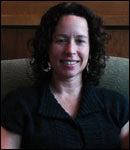Renee Duprel

1. What is your educational background?
Renee studied Finance at New York University. She is also certified to work with non-profits.
2. What is your professional background?
She worked in various companies as a financial advisor such as Meryll Lynch. Later she moved into the non-profit world and worked for multiple non-profit organizations including Seattle Foundation, and now, ISB.
3. Why did you switch to non-profit after working corporations?
“At the end of the day, instead of just creating a widget, it’s about serving people. It’s really just the mission. You know at the end of the day we are going to change the future of healthcare.”
4. What do you in development?
She works in multiple capacities in her department. She does a lot of fundraising, talking to various business and philanthropists, as well as trying to get ISB known in public. To this end, she organizes various functions such as the breakfast series, where one faculty member gives a presentation about the ISB and leads a tour. She also works with national organizations, like NIH, private foundations, and individual donors in order to raise the money needed to run the ISB.
5. How much of finding the money is done by individual researchers and teams, and how much is done by Development?
“Money comes in a couple ways here. Last year our budget was 32 million dollars. Twenty million dollars was from the NIH, that’s of course when the scientists sit and write down their grants. We have nothing to do with that. But we do help them with private foundations. And, we help with individual donors.”
6. Is working at ISB different from other non-profit places that you have worked for?
“It’s definitely different. Here it’s not purely fundraising. One of the differences here would be that we are still so new. So that’s kind of my job too, getting us out into the community.” So, Renee also does a lot of advertising about ISB by organizing functions and talks, which is something she hasn’t done in previous jobs.
7. What is the most challenging aspect of your job?
Renee feels that the most challenging aspect is dealing with economy. But, “Our town is trained to give.” There is a lot of philanthropic organizations in Seattle and several non-profits.
|

